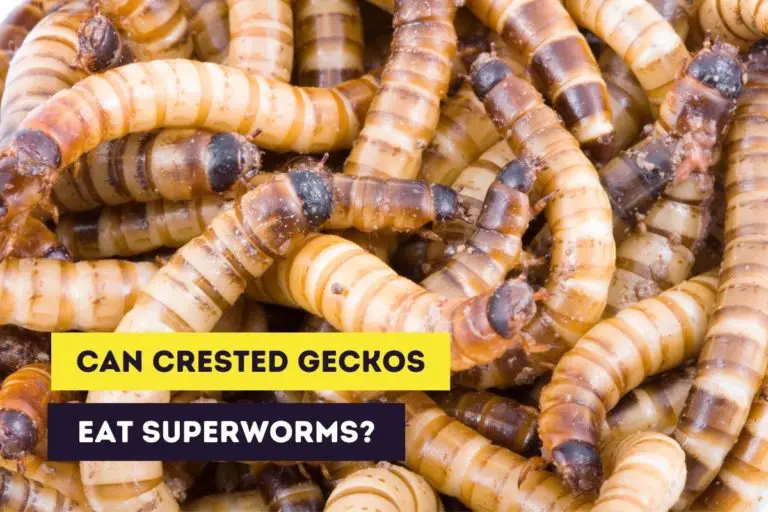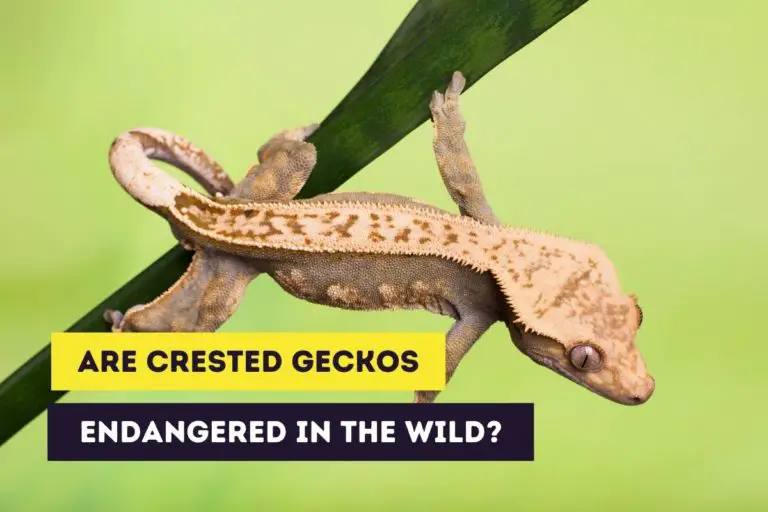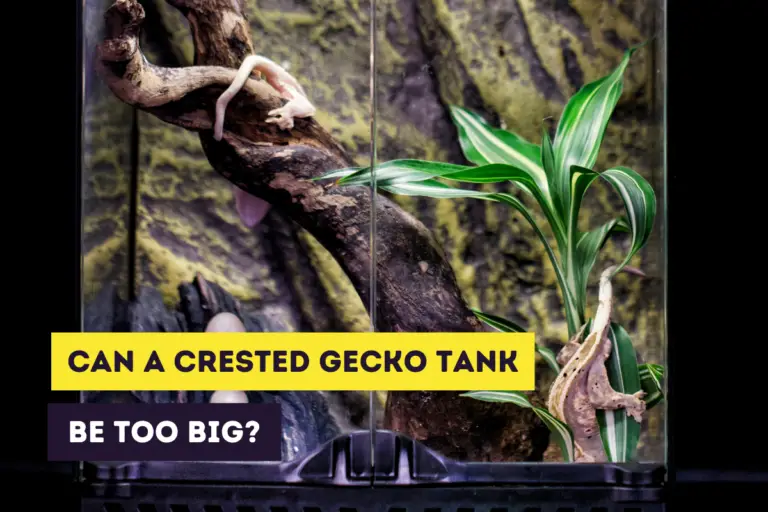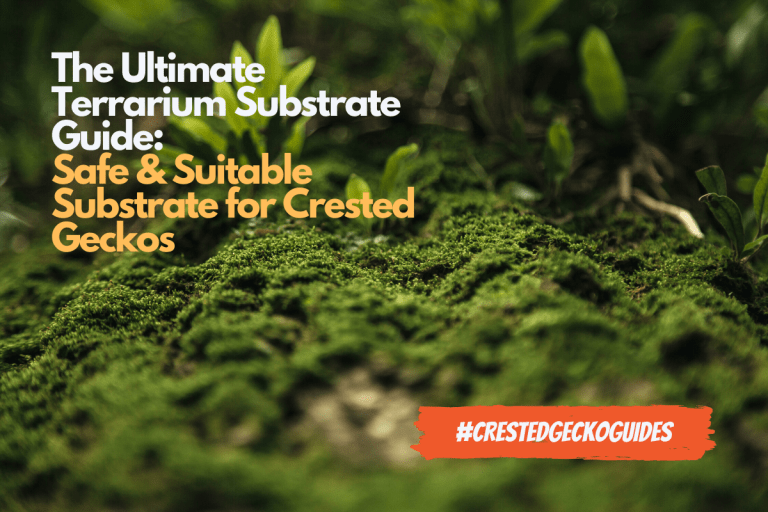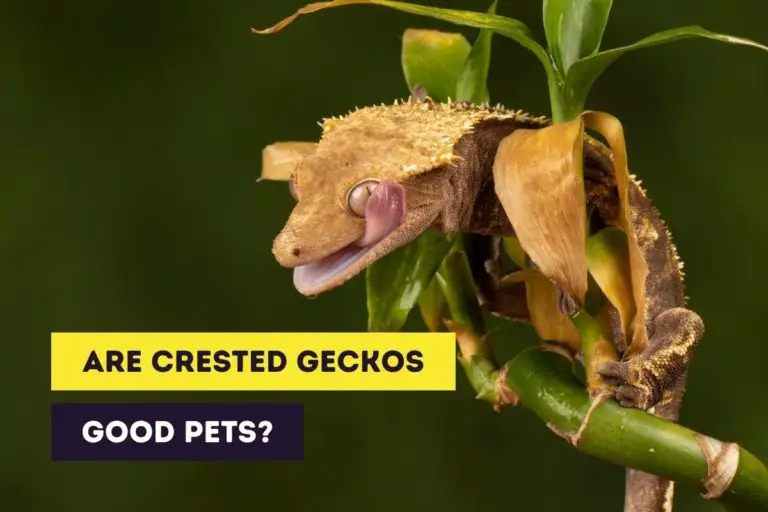Do Crested Geckos Stink? (Causes and Solutions)
Most people don’t like a smelly or stinking home. And when you think of getting a pet, this might be a concern for you or your family. You don’t want to use all kinds of means to mask the smell. So do crested geckos smell or stink?
Crested geckos are tiny animals that produce little urine and feces. Their urine and feces usually don’t have a bad or noticeable smell. Most bad smells are caused by bacteria or mold buildup and leftover food that has gone bad. These bad smells can be prevented by regularly cleaning the terrarium.
Although crested geckos don’t smell or stink, you have to regularly clean the terrarium and its interior to prevent bacteria buildup that can cause bad smells. If you don’t clean enough, the accumulated feces and urine on the interior can cause a smelly or even stinking terrarium.
Most smells come from the terrarium or cage and not from your crested gecko itself. From my own experience, I can say that I’ve – until now – never noticed any smell coming from a crested gecko. If you’re sure that the smell comes from your crestie, you should go to a vet to get him or her examined.
If you’re interested in stickers or other products of crested geckos, you can always visit our Etsy Shop, which is called Artful Animalia. We currently only send stickers in the United States. If you’re interested in certain crested gecko-related products, don’t hesitate to contact us.
In this article, you’ll learn why crested geckos are almost odorless and don’t stink. You’ll also learn what can cause bad smells and how to prevent them from happening.
This site contains affiliate links to products we recommend and use ourselves. We may receive a commission for purchases that you make through these links. If you’re interested in learning more about our affiliate links, please visit our (affiliate) disclaimer.
Why Don’t Crested Geckos Stink?
Crested geckos only produce tiny amounts of urine and feces, contrary to larger kinds of pets. And unlike most pets, their urine and feces usually don’t cause a bad or noticeable smell. But there are a few exceptions to this general observation.
First, when the urine and feces are fresh, it can be a bit smelly. When it’s dried up, most people won’t notice the smell unless you’re hanging directly with your nose above it or have a sensitive nose.
Second, it’s also been observed by many crested gecko owners that feeding insects (such as crickets) can cause bad smelling feces.
But apart from this, crested geckos don’t stink and don’t smell. This makes them perfect for people who don’t want a smelly pet.
What Can Cause a Crested Gecko to Stink?
As I already mentioned, urine and feces can sometimes cause a bad-smelling or stinking tank. But the cause for most bad-smelling tanks isn’t just the urine and feces. In fact, the most common causes of bad smells are relatively straight-forward – and easy to fix!
Common causes of bad smells:
- moist (decomposing) substrate
- leftover food
- rotting of live plants
Smells are often caused by bacteria or mold, even when dealing with a moist substrate, leftover food, or live plants’ rotting. But for a full understanding of the causes of a bad-smelling tank, I will mention these separately.
Moist substrate
There are all kinds of substrates you can use but in a humid crested gecko tank, there’s always a risk of getting substrate that is too wet. Substrate that is too wet or too moist will decompose faster and has a higher risk of getting molds.
Substrates that are known to cause a bad smell when they are (too) moist or wet are:
- (spaghnum) moss
- coconut husk
- coconut coir
- mulch
Most of the problems with the above-mentioned substrates are caused by a lack of ventilation or a terrarium that is too humid. Moss, coconut husk, and coconut coir are popular substrates for a crested gecko terrarium. But be aware that they can sometimes cause bad smells when they’re kept too wet.
Leftover food
Food such as fruit and insects can rot quickly and cause a bad smell. Bacteria, yeasts, or mold often cause a bad smell. According to Benjamin E. Wolfe, assistant professor of biology at Tufts, these microorganisms release certain chemicals themselves and the fruit and insects release certain chemicals when the microorganisms decompose them.
But even if you don’t feed fresh fruit or insects to your crested gecko, you might have to deal with bad-smelling food. I’m talking about the meal replacement powder diets that go bad after a day or two.
Powdered diets consist of water and powder (made from fruit or insects). Just like any food, they will go bad. If you leave them in for too long, it can and will stink.
Rotting of live plants
Some crested gecko owners use leaf litter on top of their substrate, especially in a bioactive terrarium. And if you use live plants in your crested gecko tank, you’ll at some point have plants dying. When the plants and leaves decompose, this gives off a specific smell, just like when food spoils.
But contrary to the smell of rotten food, the smell of decomposing plant material usually isn’t bad-smelling. Some might even say it has a pleasant scent that reminds them of a forest.
How to Stop and Prevent Bad Smells from Crested Geckos?
Although bad smells are more an exception than a rule, bad smells can happen. The following good practices will prevent this from happening and can remedy bad smells:
- proper ventilation of the crested gecko terrarium
- a layer of absorbing substrate (bedding) with a drainage layer
- removing leftover food
- regular cleaning of the terrarium
If you notice that the smell is coming from your crested gecko itself, you can bathe it by placing it in a humid container (with ventilation holes) with a damp paper towel and removing any dirt with a q-tip. Only do this if there’s visible dirt. Dirt (food, feces, urine,…) can be found mostly on the feet or tail.
Don’t place your gecko in a real bath with water! Crested geckos don’t like to swim or take a real bath and it can cause serious stress.
Well-ventilated crested gecko tank
A lack of ventilation can cause the smells in the terrarium to accumulate. Fresh air is essential, not only for your crested gecko but also to clean the air in the cage.
A ventilation cover on top of the terrarium is often sufficient to provide enough ventilation. A mesh cage also provides good ventilation but is less recommended for crested geckos as a housing option.
Substrate with drainage layer
If you use substrates other than paper towels you want to create a drainage layer to prevent the buildup of water in the substrate.
Standing water is a source for bacterial and mold buildup and can cause your terrarium to smell terrible. In a bioactive terrarium, the use of a drainage layer is especially recommended as it will benefit the live plants.
A drainage layer is created by using hydroballs or alternative products. These are small balls that are made from clay and that can absorb excess water. Between the drainage layer and your substrate, you should use a mesh (make sure to get the right size) so the substrate can’t mix with the drainage layer.
Removing leftover food
As a general rule, I would recommend removing any leftover food after 24 hours. Meal replacement powder diets can sometimes stay within the cage for a longer period but will become harder and less palatable as time goes by. I would definitely recommend removing the food after 48 hours.
Uneaten insects shouldn’t be left in the terrarium. For example, live crickets can start eating the plants and can even start nibbling on your crested gecko. They can start eating the tail or the feet of your crested gecko, causing serious harm.
Cleaning of the terrarium
Probably the most important way to keep your crested gecko tank from smelling or stinking is to clean it regularly. Depending on the kind of terrarium you have, the cleaning is different.
If you’ve got a bioactive terrarium, most of the work will be done by the so-called ‘clean up’ crew. You’ll still have to spot-clean on places where these bugs can’t reach or won’t clean up. Since crested geckos also like to climb on the glass (and urinate on them), it’s also necessary to regularly clean the glass.
But if you haven’t got a bioactive terrarium, you’ll need to do the cleaning yourself. This means that you spot-clean the terrarium daily and clean the entire terrarium at least once a month. Depending on the substrate you use, it can also be necessary to change the substrate weekly instead of once a month.
One last important thing to notice is that you’ll need to clean the floor of your tank daily if you don’t use a substrate, for example, when you’ve got baby crested geckos and don’t want to use paper towels. If you don’t, water puddles might form (from the misting or spilling of food) and this causes bacterial buildup.
Want to Learn More?
If you want to learn more about crested geckos as pets, please read the following articles.
- Can a tank be too big for a crested gecko?
- Can a crested gecko live in a 10 gallon tank?
- Why does a crested gecko lick you, itself and other objects?
If you’re interested in getting crested geckos as pets you should also definitely read our article about baby and juvenile crested gecko care or (adult) crested gecko care.


